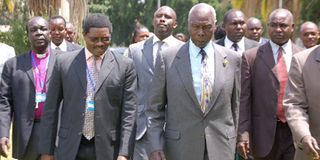Clergymen own up to partisan role in post election chaos

NCCK general secretary Rev Canon Peter Karanja (left) with former president Daniel Moi at Kabarak University shortly before he addressed the National Pastors Conference. Photo/MARTIN TELEWA
A meeting of 1,300 clergy from various churches under the umbrella of the National Council of Churches of Kenya (NCCK) marked an important watershed for the men of clothes.
The clergy re-examined their performance during the December General Election which culminated in post election violence.
Clergymen admitted to blessing warriors to engage in violence and inviting politicians to disseminate hate messages that incited people against members of various communities.
The participants were in an agreement that the church since the 2005 national referendum on draft constitution failed to provide direction and counsel.
The participants now want the church to play a pro-active and non-partisan role to foster national healing and reconciliation.
The four days meeting held at Kabarak University was opened by National Assembly Speaker Kenneth Marende.
Former President Daniel Arap Moi who was in attendance emphasized on the critical role of the church in peace building and reconciliation.
NCCK Secretary General Canon Peter Karanja said the organisation had mobilized the clergy to enable them chart the way forward.
Canon Karanja said the church body was in a process of rebuilding its image and restoring confidence amongst the faithful as the country embark on the road to national reconciliation following the post election violence.
He said some representatives of various churches not affiliated to NCCK had been invited to take part at the meeting underscoring the importance of the church in the country to remain united to effectively serve the people.
The NCCK boss said the church will address myriad of problem afflicting the country by formulating a five-year plan on reconciling communities.
The church for the second time this year has apologised to the the nation for its deeds during the post election violence that left more than 1,200 people dead and 350,000 others displaced.
Canon Karanja said the church had accepted its mistakes and had gathered the pastors from all regions and from different ethnic communities as a way of bonding them and creating a multi social and economic co-existence.
He said the conference was a key milestone in the roadmap developed by the council for the engagement in national healing and reconciliation process which brought together council membership from all regions and the wider Christian family.
“The conference is aimed at giving the pastors a chance to reflect, repent, pray together and be transformed in the power of the Holy Spirit to become agents of healing and reconciliation to the nation,” said Canon Karanja.
He noted that the church had been affected during the post election violence as many were burnt down and congregations dispersed.
Former President Moi asked the clergymen to assist the government in the resettlement of the internally displaced persons.
Mr Moi said the religion was still the best mechanism to addressing hatred and violence adding that these efforts should be intensified among the communities that worst affected by the violence.
National Assembly Speaker, Mr Marende who gave a keynote address during the NCCK General Assembly at Kabarak said sectarian politics had infiltrated the church hierarchy thus dividing it and compromising the very truth it ought to defend.
“This has permeated deeply to the extent of the clergy urging their followers to take a particular stand on topical national issues even when all indications are that the issues threaten the very peace that we preach,” said Mr Marende.
He told the congregation that the public held the church in very high esteem and that they must protect the stature.
He commended NCCK for choosing a fitting theme for the conference “The truth shall set you free” saying that it captured the current reality of the country’s fathomable predicament.
He said truth forms the cornerstone of the society’s peaceful co-existence and sustains forgiveness and trust among communities.
Mr Marende warned that violence similar to the one experienced after the last General elections might recur unless the truth is established.




